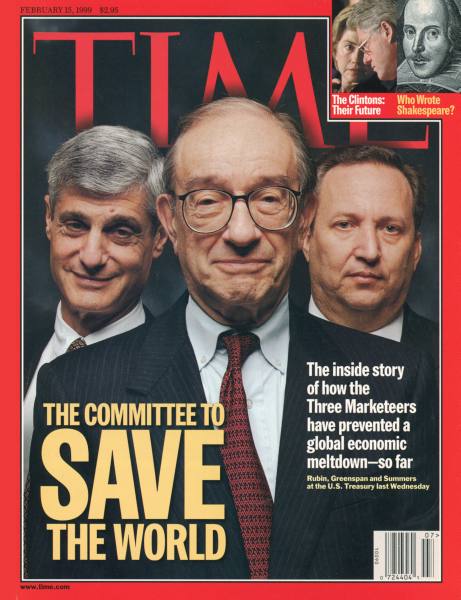by David Steven | May 10, 2010 | Economics and development, Europe and Central Asia

It was a momentous weekend in Brussels, as the European Union struggled to get to grips with the latest episode in the long financial crisis.
Fascinating to see how close it all came to the wire. At midnight, journalists milling around outside the negotiating room were wondering whether “good-quality farmland in neutral, wealthy countries” would be the best place to stash their money if the Euro collapsed.
When the package was finally announced, they were astounded by its size. “We have numbers, and they are much larger than promised,” wrote the Economist’s Charlemagne at 3 am this morning. “We are in shock and awe territory here.” Markets have been duly impressed (it will be interesting to see if this holds as analysts dig into the fine print).
At best however, the deal is a stopgap . There’s been a consensus for months now that Greece will be unable to avoid an eventual restructuring of its debt (hopefully, a planned default). Many believe the same holds for some, or all, of the other PIGS (Ricardo Cabral for one, or Morgan Stanley’s Paolo Batori for another).
My question for Europe’s finance ministers – will you now get ahead of the curve on the Eurozone’s chronic problems, or are you going to drift towards another crisis?
In the wake of Japan’s lost decade, it became fashionable for the British media to excoriate the Japanese government for failing to deal with its zombie banks (and the zombie companies on their balance sheets that had consigned the financial system to the realms of the living dead).
In 2002, the Economist bemoaned ‘the sadness of Japan‘:
From the Japanese government, there will be strenuous efforts to claim that reform is under way, that problems are being solved, that new measures are being considered. The claims will even be true, in a sense: there are plans aplenty, with stages and pillars and fine aspirations. But in a rather stronger sense they will be false: reforms are not being implemented, problems are not being solved, new measures are likely to make as little progress as the old ones. Japan is in a slow, so far genteel decline.
Perhaps the saddest thing is that there is nothing new about this. The turn in Japan’s fortunes began in 1990 with the crash in its stock and property markets, and then took firm hold in the mid-1990s when banks started to crumble and public borrowing lost its ability to keep the economy growing. As long ago as September 26th 1998, The Economist lamented on its cover about “Japan’s amazing ability to disappoint”.
But doesn’t Europe now have at least one zombie country in its midst- and possibly more (and zombie banks too, exposed to these countries’ debt)? And won’t the Eurozone continue to suffer almost indefinitely if it fails to take decisive action to take these countries through an orderly bankruptcy and get them back on a sustainable track?
(As an addendum, what about the UK? Could it become a zombie too? No. If markets stop funding British government debt, then the end will be swift. The IMF may ease the restructuring, but there’s no Eurozone for the UK to hide in. Relatedly, pre-election thoughts on how a Cameron-led government should deal with Europe, the economic crisis, and a volatile world.)
by David Steven | Apr 1, 2010 | Global system
Opening Remarks at a Seminar on Confronting the Long Crisis of Globalization – Risk, Resilience and International Order (pdf of paper), Brookings Institution, 29 March 2010
The forerunner of this paper was commissioned by the UK Prime Minister in Spring 2008 and was presented at the Progressive Governance Summit in Watford on 5 April of that year.
At the table were a dozen or so heads of state, plus the heads of the WTO and IMF, and a few wildcards, most visibly Bill Clinton, who spent much of the summit in a rage about a mysterious figure he would only identify as ‘my wife’s opponent.’
Our section of the agenda was on building an international system that could withstand global risks, but its start was much delayed. Leaders wanted to get stuck into the nitty gritty of the most recent and pressing crisis – an economic one. Bear Stearns had just been bailed out and heads were clearly shocked by what this had revealed about global economic systems.
That day, the general view was that the acute phase of the crisis was now over. While the world had experienced unprecedented market turbulence, the situation was now under control and the focus should switch to rebuilding. As it turned out, of course, the tsunami of financial destruction was still building – with the worst impact months later, after Lehman’s was allowed to collapse in the Autumn.
Governments were forced to admit that they had little idea of how global economic systems worked – and still have only provisional thoughts about how to fix them. If the financial crisis has changed anything, it’s that it’s now acceptable to admit that too often, today, policymakers simply don’t know what to do. Our presentation to leaders was written from the belief that this crisis of confidence was not just confined to the economic sphere.
We have lived through an unexpectedly turbulent opening decade of the 21st century. The financial crisis shattered all assumptions about how economic risk is controlled, especially as it crosses the borders between organizations, countries, and categories (from the risk itself, to instruments derived from that risk).
We also witnessed 9/11 and the ill-considered and poorly-executed invasions of Afghanistan and Iraq that followed it – an event that took governments by surprise, and a reaction that was marred by moral, strategic and intelligence failures. 9/11 has, and will continue to have, far-reaching implications for the way the US and its allies think about security, while also significantly limiting their scope for action when confronted by new threats.
Finally (and least commented upon), we experienced a pronounced oil and food price spike – a harbinger of how difficult it will prove to cope with the world’s interrelated demographic, economic, and resources constraints. Again, it is clear that we lack understanding of the complex interplay between demand (driven by population numbers, wealth and, on occasion, speculation) and supply (driven by natural limits, investment patterns, and regulation) across a range of resources, each with interlinked patterns of usage and pricing.
Looking at these three events, we see a number of common threads which taken together define what we term the long crisis of globalization. These include:
- Scarcity, limits to the sustainable consumption of highly strategic commodities such as energy, land, water, food and ‘atmospheric space’ for emissions.
- Instability, the tendency for complex systems to experience unpredictable and unsettling shifts.
- And finally, the potential for the deliberate disruption of fragile global systems – whether by terrorists, rogue states, or the inventors of that other potent weapon, the CDO or collateralized debt obligation.
(more…)
by David Steven | Mar 31, 2010 | Economics and development, Global Dashboard, Global system
[youtube]http://www.youtube.com/watch?v=AA0mFjJbNH8[/youtube]
It’s commonplace to describe the financial crisis as a once-in-a-century event, but I question whether that is the case. Perhaps we’re not in the midst of a short-lived financial shock, but a long crisis that stretches back into the 1990s.
Here’s Paul Blustein on Alan Greenspan:
The Fed chief told the G-7 that in almost fifty years of watching the U.S. economy, he had never witnessed anything like the drying up of markets in the previous days and weeks.
Greenspan wasn’t speaking in Autumn 2008 when Lehman’s collapsed, however, but ten years’ earlier in the wake of the spectacular blow-up of Long-Term Capital Management, which lost $4.5 billion almost overnight in what the fund’s principals post-rationalised as a 100-year flood.
Long-Term (with its superbly hubristic name) was brought low by derivatives, just as Lehman’s would be a decade later.
(Robert Rubin, Clinton’s Treasury Secretary, was one of those left picking up the pieces – part of ‘the committee to save the world’, with Greenspan and Larry Summers. Rubin went on to preside over Citigroup as it needed a succession of massively expensive bailouts, when its derivatives tanked in the subprime crisis.)

The proximate cause of Long-Term’s failure was Russia’s Rouble crisis, when the country defaulted on its debt after the IMF refused to mount a second bailout.
The Russian crisis itself came in the midst of a long series of dramatic economic failures that hits the world between 1997 and 1999, mostly in East Asia (Thailand, South Korea, Indonesia etc), but which also battered Brazil and would devastate Argentina in 2002. Blustein again:
Time and again, panics in financial markets proved impervious to the ministrations of the people responsible for global economic policymaking.
IMF bailouts fell flat in one crisis-stricken country after another, with the announcements of enormous international loan packages followed by crashes in currencies and sever economic setbacks that the rescues were supposed to avert.
(more…)


